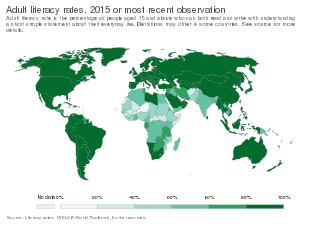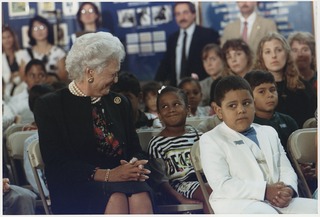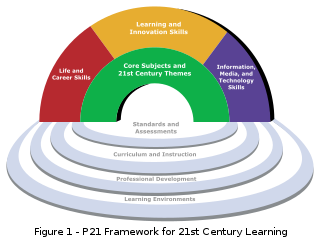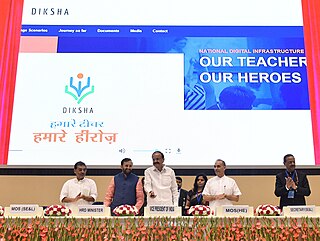Related Research Articles

Literacy in its broadest sense describes "particular ways of thinking about and doing reading and writing" with the purpose of understanding or expressing thoughts or ideas in written form in some specific context of use. In other words, humans in literate societies have sets of practices for producing and consuming writing, and they also have beliefs about these practices. Reading, in this view, is always reading something for some purpose; writing is always writing something for someone for some purpose. Beliefs about reading, writing and their value for society and for the individual always influence the ways literacy is taught, learned, and practiced.

Adult education, distinct from child education, is a practice in which adults engage in systematic and sustained self-educating activities in order to gain new forms of knowledge, skills, attitudes, or values. It can mean any form of learning adults engage in beyond traditional schooling, encompassing basic literacy to personal fulfillment as a lifelong learner, and to ensure the fulfillment of an individual.

Numeracy is the ability to understand, reason with, and to apply simple numerical concepts. The charity National Numeracy states: "Numeracy means understanding how mathematics is used in the real world and being able to apply it to make the best possible decisions...It’s as much about thinking and reasoning as about 'doing sums'". Basic numeracy skills consist of comprehending fundamental arithmetical operations like addition, subtraction, multiplication, and division. For example, if one can understand simple mathematical equations such as 2 + 2 = 4, then one would be considered to possess at least basic numeric knowledge. Substantial aspects of numeracy also include number sense, operation sense, computation, measurement, geometry, probability and statistics. A numerically literate person can manage and respond to the mathematical demands of life.
The Key Skills Qualification is a frequently required component of 14-20 education in England, Northern Ireland and Wales. The aim of Key Skills is to encourage learners to develop and demonstrate their skills as well as learn how to select and apply skills in ways that are appropriate to their particular context.
Summer learning loss or summer slide, is the loss of academic skills and knowledge over the course of summer vacation in countries that have lengthy breaks in the school year, such as the US and Canada. Schools see evidence of this because students are often given a standardised test prior to the summer break and again when they return to school in the autumn.
Direct instruction (DI) is the explicit teaching of a skill set using lectures or demonstrations of the material to students. A particular subset, denoted by capitalization as Direct Instruction, refers to the approach developed by Siegfried Engelmann and Wesley C. Becker that was first implemented in the 1960s. DI teaches by explicit instruction, in contrast to exploratory models such as inquiry-based learning. DI includes tutorials, participatory laboratory classes, discussions, recitation, seminars, workshops, observation, active learning, practicum, or internships. Model includes "I do" (instructor), "We do", "You do".

Information and media literacy (IML) enables people to show and make informed judgments as users of information and media, as well as to become skillful creators and producers of information and media messages. IML is a combination of information literacy and media literacy. The transformative nature of IML includes creative works and creating new knowledge; to publish and collaborate responsibly requires ethical, cultural and social understanding.
Skills for Life is a national lifelong learning strategy in England for improving adult skills, designed to help learners develop their reading, writing, maths, technical, and digital skills. It provides universal free education and training; including courses in digital, numeracy and transferable skills; traineeships; apprenticeships; and vocational qualifications for all adults in further education colleges and beyond.

Literacy in the United States was categorized by the National Center for Education Statistics into different literacy levels, with 92% of American adults having at least "Level 1" literacy in 2014. Nationally, over 20% of adult Americans have a literacy proficiency at or below Level 1. Adults in this range have difficulty using or understanding print materials. Those on the higher end of this category can perform simple tasks based on the information they read, but adults below Level 1 may only understand very basic vocabulary or be functionally illiterate. According to a 2020 report by the U.S. Department of Education, 54% of adults in the United States have English prose literacy below the 6th-grade level.

Reading is the process of taking in the sense or meaning of letters, symbols, etc., especially by sight or touch.
Remedial education is assigned to assist students in order to achieve expected competencies in core academic skills such as literacy and numeracy.

The National Assessment Program – Literacy and Numeracy (NAPLAN) is a series of tests focused on basic skills that are administered to Australian students in year 3, 5, 7 and 9. These standardised tests assess students' reading, writing, language and numeracy and are administered by the Australian Curriculum, Assessment and Reporting Authority (ACARA). The National Assessment Program is overseen by the Education Ministers Meeting.
Adult Learners' Week is an international festival of adult learning. It is a UNESCO initiative that was first celebrated in the United States in the late ’80s, where there was a move to create a broad celebration of adult learning by the American Association for the Advancement of Education (AAAE).
Learning development describes work with students and staff to develop academic practices, with a main focus on students developing academic practices in higher education, which assess the progress of knowledge acquired by the means of structural approaches. Learning developers are academic professionals who: teach, advise and facilitate students to develop their academic practices; create academic development learning resources; and reflect on their own academic practices through a community of practice.

The World Literacy Foundation(WLF) is a global not-for-profit that works to lift young people out of poverty through literacy. Founded in Melbourne, Australia in 2003, the World Literacy Foundation operates on the principle that education is a basic human right. It aims to eradicate global illiteracy through the promotion of literacy and the provision of educational resources.
Kenneth "Ken" Leithwood is an educational researcher and professor at the Ontario Institute for Studies in Education in Toronto, Canada.
Yes, I Can is a teaching method for adult literacy which was developed by Cuban educator Leonela Relys Diaz and first trialled in Haiti and Nicaragua in 2000. To date, this method has been used in 29 nations allowing over 6 million people to develop basic literacy. The program was originally developed in Spanish and known as Yo, sí puedo. It has now been translated into many languages including Portuguese, English, Quechua, Aymara, Creole and Swahili. The Yes I Can literacy method uses pre-recorded lessons on video or DVD that are delivered by a local facilitator. Yes I Can also uses an alphanumeric association between numbers and letters.

21st century skills comprise skills, abilities, and learning dispositions that have been identified as being required for success in 21st century society and workplaces by educators, business leaders, academics, and governmental agencies. This is part of a growing international movement focusing on the skills required for students to master in preparation for success in a rapidly changing, digital society. Many of these skills are also associated with deeper learning, which is based on mastering skills such as analytic reasoning, complex problem solving, and teamwork. These skills differ from traditional academic skills in that they are not primarily content knowledge-based.

The National Education Mission is an overarching programme for the school education sector extending from pre-school to class 12, launched in 2018. It was allocated a budget of ₹385.72 billion (US$4.8 billion) in the 2019 Interim Union Budget of India. The stated mission comprises four schemes, namely Saakshar Bharat, Sarva Shiksha Abhiyan, Rashtriya Madhyamik Shiksha Abhiyan and the Centrally Sponsored Scheme on Teacher Education (CSSTE). In 2021, the NIPUN Bharat Mission was launched as part of Samagra Shiksha Abhiyan, teaching literacy and numeracy skills in universities by Grade 3.

Sustainable Development Goal 4 is about quality education and is among the 17 Sustainable Development Goals established by the United Nations in September 2015. The full title of SDG 4 is "Ensure inclusive and equitable quality education and promote lifelong learning opportunities for all".
References
- ↑ "Launch". SiMERR . Archived from the original on 6 March 2014.
- ↑ "SiMERR". Deakin University . Archived from the original on 24 February 2012.
- ↑ "UNE News and Events: National Summit aims at equal opportunities for regional students". University of New England . Archived from the original on 1 January 2006.
- 1 2 "SiMERR – National Research Centre". SiMERR .
- ↑ "Project Background – QuickSmart". SiMERR . Archived from the original on 16 April 2020.
- ↑ Pegg, J. & Graham, L. 2007, 'Addressing The Needs Of Low-Achieving Mathematics Students: Helping Students 'Trust Their Heads, Keynote. In K. Milton, H. Reeves, & T. Spencer (Eds.) Proceedings of the 21st biennial conference of the Australian Association of Mathematics Teachers. ISBN 978-1-875900-63-3
- ↑ Pegg, J.E., Graham, L.J. and Bellert, A. 2005, The effect of improved automaticity of basic number skills on persistently low-achieving pupils , Learners and Learning Environments, 29th Conference of the International Group for the Psychology of Mathematics Education, vol.4, 4-49.